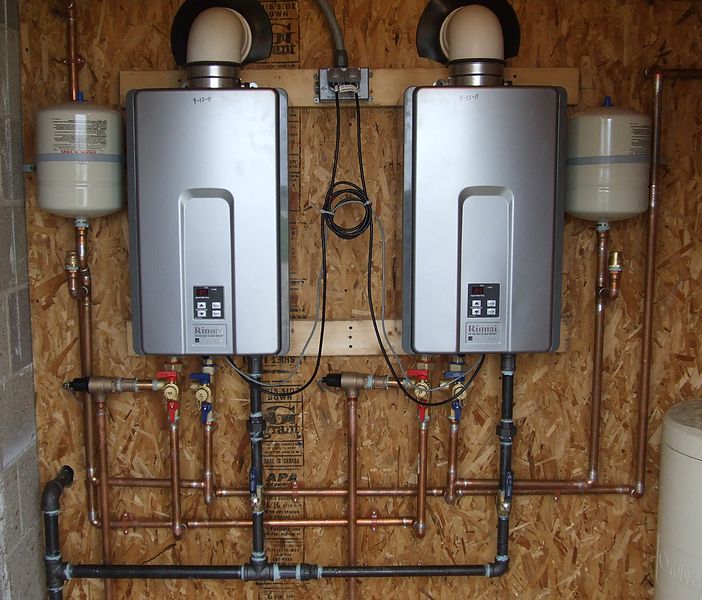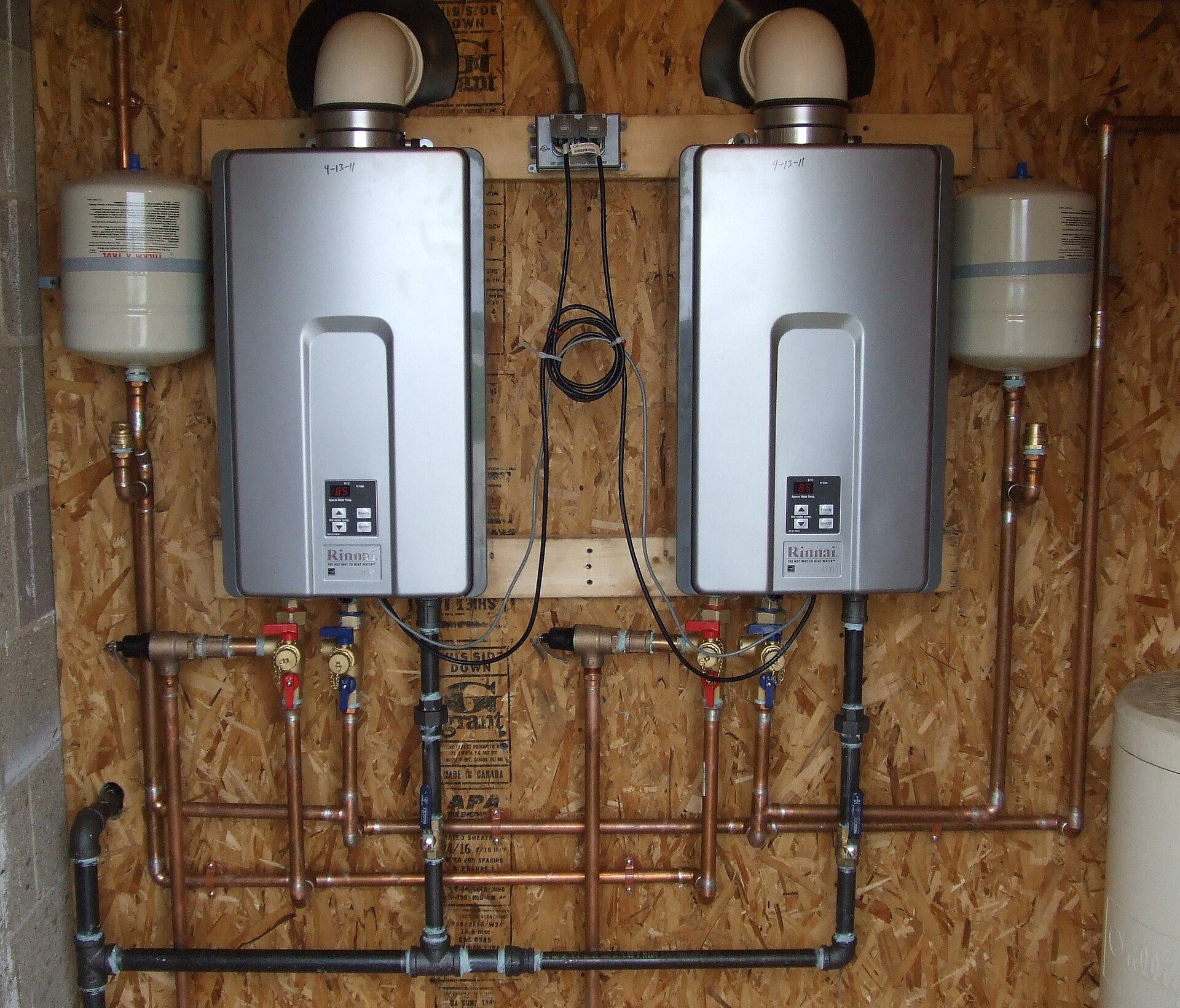Learning About The Actual Benefits Of Continuous-Flow Water Heaters
Learning About The Actual Benefits Of Continuous-Flow Water Heaters
Blog Article
We've come across this post on Six Benefits of a Tankless Hot Water Heater listed below on the net and figured it made perfect sense to talk about it with you on this page.

In a globe where benefit and efficiency preponderate, it's not a surprise that property owners are constantly looking for smarter ways to handle their home's energy intake and comfort. One innovation that has progressively gained appeal is the tankless hot water heater. But exactly what makes these systems attract attention from the conventional tank-based versions most of us grew up with? Let's dive in and explore the advantages of tankless water heaters, aiding you make a decision if it's time to make the switch in your house.
Introduction
Image this: you step into the shower after a lengthy day, expecting a calming cascade of hot water, just to be welcomed by icy beads due to the fact that the last individual utilized all of it up. Audio acquainted? Traditional water heaters save a set quantity of warm water, suggesting you go to the grace of that container's supply. Tankless systems, on the other hand, warmth water as needed. Say goodbye to going out mid-shower, no more fumbling with routines just to make sure hot water is offered.
Understanding Tankless Hot Water Heater
What Are Tankless Water Heaters?
Tankless hot water heater, sometimes called on-demand or instantaneous water heaters, offer warm water just as it's required. Instead of saving gallons of pre-heated water, these units kick right into action the moment you activate the tap. Water travels through a heat exchanger, warming up in real-time, indicating you obtain an undisturbed circulation of hot water without the requirement for a large tank resting idly by.
Just how Do They Vary from Standard Systems?
Traditional heating units hold a storage tank of warm water, utilizing power to maintain that container at a consistent temperature. Tankless units get rid of the standing supply, lowering squandered power and the large footprint of a large cylinder. Essentially, you're updating from a "accumulation" frame of mind to a "made-to-order" approach.
Typical Kinds Of Tankless Systems
Tankless water heaters generally come in 2 selections: gas and electrical. Gas models tend to supply greater flow prices, suitable for larger households, while electrical models frequently offer smaller sized homes and are generally easier to set up. Additionally, some systems are made for point-of-use (serving one component) while others can deal with the whole home's hot water demands.
Secret Advantages of Tankless Hot Water Heater
1. Unlimited Warm Water Supply
Ever needed to arrange showers so every person gets their fair share of hot water? With tankless, that ends up being a distant memory. As long as the heating system's flow ability isn't exceeded, you can take back-to-back showers without becoming a popsicle.
2. Power Performance and Price Savings
Say goodbye to heating a giant tank's worth of water and keeping it toasty throughout the day. Tankless heating systems lower standby power losses, which can decrease utility expenses. While the preliminary expense might be higher, the long-term financial savings often justify the investment.
3. Space-Saving Style
If your home is short on storage, eliminating the large storage tank maximizes important room. Tankless devices are compact and can typically be installed on wall surfaces, tucked away in edges, or installed in tight utility storage rooms without having all to oneself the whole space.
4. Longer Lifespan
A properly maintained tankless water heater can outlast its tank-based relative. Conventional containers might last 10-15 years, while tankless designs can maintain downing along for two decades or even more, making them a strong financial investment in time.
5. Improved Water High Quality
Keeping water in a container can sometimes result in sediment build-up or a somewhat "off" preference. With tankless systems, fresh water is heated up right away, reducing the chances of sediment buildup and potentially using cleaner-tasting water.
Factors to consider Before Switching
Though the advantages are engaging, it's a good idea to take into consideration a couple of factors prior to totally committing.
Preliminary Financial Investment Costs
Tankless heating systems generally come with a higher ahead of time price. Between the system itself and possible installment adjustments, the first price could provide you sticker shock. But bear in mind to see it as a long-term financial investment.
Setup Requirements
Relying on your home's infrastructure, you may need additional electrical ability or gas line upgrades. Ensure you recognize the setup demands and seek advice from a specialist to prevent surprises.
Examining Your Home's Water Usage Patterns
If your house all at once makes use of multiple fixtures with high warm water need, see to it the system's circulation price fulfills your needs. Knowing your usage patterns assists you pick the best dimension and type of tankless heater.
Maintenance and Care Tips
Tankless systems are relatively reduced upkeep, but they aren't set-it-and-forget-it appliances.
Normal Cleansing and Descaling
Hard water minerals can build up in the heat exchanger, affecting efficiency. Routine descaling (usually recommended every year) maintains the system going for peak performance.
Yearly Professional Inspections
A yearly checkup from an expert guarantees small issues are captured early. They'll examine the system's efficiency, search for leaks, and aid maintain ideal performance.
Making Sure Appropriate Ventilation
For gas models, correct ventilation is necessary to securely expel exhaust gases. See to it venting systems are tidy and properly mounted to stop any kind of prospective safety and security hazards.
Contrasting Different Brands and Versions
Not all tankless hot water heater are created equivalent.
Investigating Reputable Producers
Look for reputable brands with a background of producing top quality units. A dependable manufacturer commonly provides much better consumer support and longer service warranties.
Reviewing Evaluations and User Comments
Individual evaluations and feedback from next-door neighbors or close friends who have actually gone tankless can provide important understandings. Often, real-life experiences can be a lot more informing than marketing pamphlets.
Installation: Do It Yourself or Specialist?
While some homeowners enjoy tackling jobs themselves, tankless installment could not be the most effective time to break out the toolbox.
Benefits and drawbacks of Do It Yourself Installation
A DIY install could conserve cash, however it features threats. Wrong setup can result in inefficiency or safety worries. If you're handy and have experience, it might be practical-- but wage caution.
When to Call an Expert Plumbing
For the majority of, calling a professional makes certain every little thing's done correctly. An expert plumbing professional comprehends regional codes, sizing needs, and venting specifications, reducing the threat of incidents.
Making the most of Performance
You've bought a tankless system-- now optimize its effectiveness.
Optimum Temperature Settings
Most people set their units between 120-140 F. Readjusting the temperature can enhance convenience and financial savings. Experiment to find a sweet place that does not lose energy.
Pairing with Low-Flow Fixtures
Intend to stretch your unit's capabilities? Think about setting up low-flow showerheads and faucets. They minimize water usage, allowing your tankless system to provide a steady stream of warm water without straining.
Ecological Impact
Tankless water heaters line up with greener living objectives.
Decreased Carbon Footprint
By utilizing much less power and just home heating water as required, tankless systems can reduce your home's carbon footprint, decreasing your ecological effect.
Conserving Natural Resources
Much less energy usage and much less wasted warm water equate into less natural resources being utilized, an environmental win-win.
That Benefits A Lot Of from Tankless Heaters?
The appeal of tankless heating systems is that they can suit a range of households.
Huge Households vs. Solitary Owners
Large family members could enjoy the limitless warm water supply, while solitary owners value the power financial savings from not warming a whole storage tank for just one person's early morning shower.
House Owners with Restricted Space
If your home is short on square footage, shedding the bulky container maximizes room for various other essentials-- or perhaps simply a lot more elbow room.
Eco-Conscious Customers
Going tankless aligns with eco-friendly values, ensuring you're not throwing away energy or sources.
Future Trends in Tankless Hot Water Heater
The world of home appliances is ever-evolving, and tankless water heaters are no exception.
Smart Home Integration
Imagine changing your hot water heater's temperature level via an application or obtaining upkeep signals on your phone. As smart home tech developments, we'll see even more connection and benefit.
Innovations in Innovation
R&D is frequently improving warm exchangers, making systems more effective and resilient. Future versions might be even quieter, a lot more portable, and better suited for varying climates.
Conclusion
Selecting a tankless hot water heater is greater than just upgrading your home's warm water system; it's buying lasting comfort, power efficiency, and a greener way of life. By considering your house's water use, bearing in mind setup needs, and devoting to regular upkeep, you can appreciate a constant stream of warm water without the luggage of a cumbersome storage tank. As innovation develops, you can anticipate even smarter, extra efficient tankless solutions that not just make your life simpler but likewise benefit the planet.
Six Benefits of a Tankless Hot Water Heater
Continuous hot water. Large families know what a pain it is to hop into the shower and get blasted with cold water. With a tankless hot water heater, this doesn't happen as long as you install the right size tank. Even if you don t have a large family, a tankless hot water heater allows you to use multiple appliances at once without running out of hot water. Reduced energy bill. Because tankless heaters are essentially "off" when the water tap is not on, they use less energy overall. In fact, an ENERGY STAR-qualified tankless hot water heater can use 25-40% less energy than a conventional water heater, and save the average family $100 or more annually. Longer life. Get more bang for your buck with a greater lifespan. Specifically, conventional hot water heaters last about 10-13 years compared with up to 20 years for a tankless hot water heater. Less space. Did you know that tankless hot water heaters can be hung on a wall almost anywhere in your home? Plus, at 28" tall by 20" wide and 10" deep, a tankless hot water heater takes up a lot less space than a conventional hot water heater, which is 60" tall and 24" wide. Good for the environment. In addition to reducing the amount of energy used, most propane-fired tankless water heaters are made of recycled materials. Many conventional tanks, on the other hand, go directly to the dump once they've served their purpose. High safety ratings. Conventional water heaters are "always on" and thus pose safety risks more often than do tankless heaters, which only operate when warm water is needed. https://www.rotorooter.com/blog/water-heaters/six-benefits-of-a-tankless-hot-water-heater/

Do you enjoy more info about Unveiling the Hot Trend: The Benefits of Tankless Water? Leave feedback directly below. We would be pleased to know your reactions about this entry. Hoping to see you back again in the future. Make sure you take the time to share this post if you liked it. We recognize the value of your readership.
Book-Now Report this page